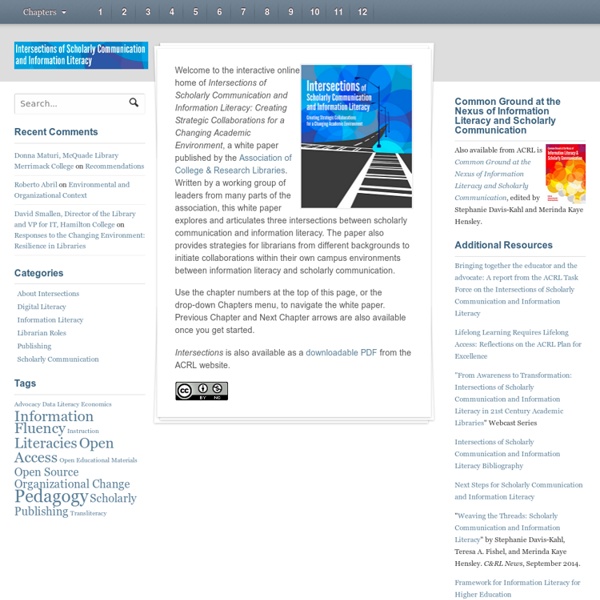Scholarly Communication
Scholarly communication can be defined as “the system through which research and other scholarly writings are created, evaluated for quality, disseminated to the scholarly community, and preserved for future use. The system includes both formal means of communication, such as publication in peer-reviewed journals, and informal channels, such as electronic listservs.” In an environment that is increasingly global, the ARL Scholarly Communication program encourages the advancement of effective, extensible, sustainable, and economically viable models of scholarly communication that provide barrier-free access to quality information. ARL also encourages initiatives for new modes of scholarship that demonstrate promise for the future. The program currently has the following components: Below are links to information and resources on key topics in scholarly communication.
Subject Guides
Subject guides are lists of resources created by librarians to assist students with their research needs. These list of resources may include topics including but not limited to books, journals, databases, websites, as well as any other topics the librarian feels would assist students with their research. LibGuidesare a type of subject guide used by libraries across the world. A LibGuide is a content management and publishing system created by SpringShare. Libraries may use LibGuides to create subject guides, course guides, information portals, or research help pages to name a few. An important aspect of LibGuides that may interest librarians is the statistical features of LibGuides. El Dorado Center Library's Internet Subject Directories, Canadian Studies Research Guide. This is a student's guide to selected resources for the study of Canadian culture, society, economics, and political science. Who are the intended users? Consider the subject area.
Socratic Method Research Portal
asking for it
A report published this week by OCLC Research asks the burning question of no one, no where: “Does every research library need a digital humanities center?” The answer, of course, is of course not. Of course, I’m being rude. The click-bait question, as posed, had a foregone conclusion — but there’s much to recommend in the report, even if it fails to define a “DH center” in any clear way, makes an unwarranted assumption that “DH academics” and librarians exist in mutually-exclusive categories, and bases too much of its understanding of faculty and researcher perceptions on the inadequate sample of some conference-going and a couple of focus groups (however carefully convened and accurately reported). every center must evolve — evolve, or die. Okay, the chief value of the report is in its clear reinforcement of the notion that a one-size-fits-all approach to digital scholarship support never fits all. How is that good for the humanities, digital or otherwise? no good deed goes un-punished.
The Museums, Libraries & Archives Council
Critical Thinking: What is True and What to Do
Many researchers suggest that a key characteristic of critical thinking is the ability to recognize one’s own fallibility when evaluating and generating evidence — recognizing the danger of weighing evidence according to one’s own beliefs. The expanding literature on informal reasoning emphasizes the importance of detaching one’s own beliefs from the process of argument evaluation (Kuhn, 2007; Stanovich & Stanovich, 2010). The emphasis placed on unbiased reasoning processes has led researchers to highlight the importance of decontextualized reasoning. Kelley (1990) argues that “the ability to step back from our train of thought . . . . is a virtue because it is the only way to check the results of our thinking, the only way to avoid jumping to conclusions, the only way to stay in touch with the facts” (p. 6). Various tasks in the heuristics and biases branch of the reasoning literature involve some type of decontextualized reasoning (Kahneman, 2003; Stanovich, 2003). References
Archives & Records Management | Faculty of Information (iSchool) | University of Toronto
Become an ARM professional Archivists are responsible for identifying and preserving historical records and making them available to the public. They assess the long-term value of both analog and digital records as trustworthy evidence and memory of the activities of individuals, families, and organizations. They ensure that the records generated by these creators are protected and accessible to present users and future generations. To accomplish these goals, they develop and implement strategies and methods for appraising records for acquisition and selection, planning, executing and monitoring preservation actions and processes, and create a wide range of research tools aimed at making the holdings of archives known to the public. Records Managers are the experts we go to ask for guidance on managing our current records, compliance to recognized standards, and policies for information and data management often found within corporations. Specifications & Features Program Features
Logos, Ethos and Pathos: 3 Ways to Appeal to an Audience in Essays
Last revised: March, 2014 Acceptance of Terms Please read this Terms of Service Agreement ("Terms of Service", "Terms of Use") carefully. These terms apply to Education Portal and its related websites owned and operated by Remilon, LLC ("Education Portal,", "Site", "Sites", "our", "us"). Education Portal provides the Services, which are defined below, to you subject to the following Terms of Service, which may be updated by us from time to time without notice to you. YOU AGREE THAT BY USING THE SERVICE YOU REPRESENT THAT YOU ARE LEGALLY ABLE TO ENTER INTO THIS AGREEMENT AND YOU CERTIFY TO EDUCATION PORTAL THAT: (i) you are at least eighteen (18) years of age, or an emancipated minor, or possess legal parental or guardian consent. Privacy Policy Education Portal respects your privacy and permits you to control the treatment of your personal information. Terms Applicable to All Services We continually update the Education Portal service, including the course and content library. a. i. b. i.



